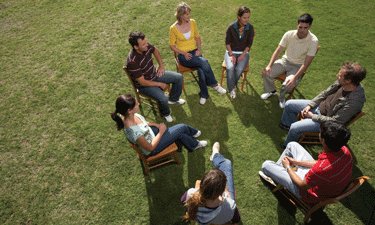 Our world is constantly advancing, from technology to opportunities and on to basic everyday language. Recreation is following this trend, reflected by recreation providers moving from the concept of merely performing a function for constituents to providing an identity for them. As young professionals, we are excited because we see a need for our skills, ingenuity and innovation to assist with this transition toward a more intentional form of recreation. Our education at Brigham Young University has uniquely trained us to transform programs into more meaningful experiences.
Our world is constantly advancing, from technology to opportunities and on to basic everyday language. Recreation is following this trend, reflected by recreation providers moving from the concept of merely performing a function for constituents to providing an identity for them. As young professionals, we are excited because we see a need for our skills, ingenuity and innovation to assist with this transition toward a more intentional form of recreation. Our education at Brigham Young University has uniquely trained us to transform programs into more meaningful experiences.
For our purposes, an experience is defined as a structured, emotional interaction between participants and providers. The idea of transforming a simple program to an experience is explained in the Experience Economy Model developed by B. Joseph Pine and James H. Gilmore. This model, which is a continuum of the development of creating meaningful experiences, is important because it outlines the steps of how to move a recreation program through the continuum. The continuum explains the progression of a commodity to a good to a service to an experience that then creates an identity for an individual or a community. One example we have found of this in our own professional experience is the development of the Provo City Christmas Market.
Provo City began by recognizing the holidays, bought Christmas lights and created a parade to correspond with the concluding ceremony of turning on the lights decorating downtown. The Christmas market has evolved into a community identifying event that involves co-creating with local vendors, intentionally themed music, food and fireworks. All of these aspects create a collaborative identity for people who attend.
The Christmas Market was initially a commodity, or a raw, undeveloped idea. In the event’s conception, the commodity is the city recognizing the holiday. The good, or the tangible item, is represented as the city providing Christmas lights. The element of service is represented by the event’s progression to a ceremony of turning the lights on for the community. The experience is then the staged event that leads up to the turning on of the lights downtown. The results of this experience help community members develop a sense of identity and loyalty to Provo. It is the customized nature or personalization of this event that creates loyalty to this program, and all other events put on by Provo City.
As young trained professionals, we have seen the growth of this event and the effect it has had on the city, and are able to replicate it in other programs. It is this effect that makes us passionate about the experience that we will create in the future. We are excited to be in this field because creating these experiences is the execution of our education.
We give ourselves the title of experience engineers. We are in the business of improving quality of life — this is the fulfilling factor of this career choice. The reason why we use the Experience Economy Model is because experiences are not only changing, but the impact they create matters.
Events define a community and its people. Not only does an event provide recreation, it is also part of who the members of a community are. All cities have the ability to create these experiences and establish this same sense of purpose and unity.
We want to be on the front lines of experience creation. The excitement of this field comes from innovation and ingenuity. We recognize the irreplaceable value of experiences over commodities, and that the profession of providing experiences needs its own attention and skill set, which we are excited to provide. We believe experiences are not just designed to be structured, they are designed to be lived to enhance the quality of life.
Joshua Magleby is an undergraduate studying Recreation Management at Brigham Young University and a Marketing and Operations Intern at the Utah Youth Soccer Association. Starlee Jacobs is an undergraduate studying Recreation Management at Brigham Young University and a Special Events Intern Leader at Utah’s Provo Parks and Recreation. Mary Dunn is an Events Leader at Utah’s Provo Parks and Recreation. Noemi Morales is an undergraduate studying Recreation Management at Brigham Young University and a Recreation Leader at Utah’s Provo Parks and Recreation.

